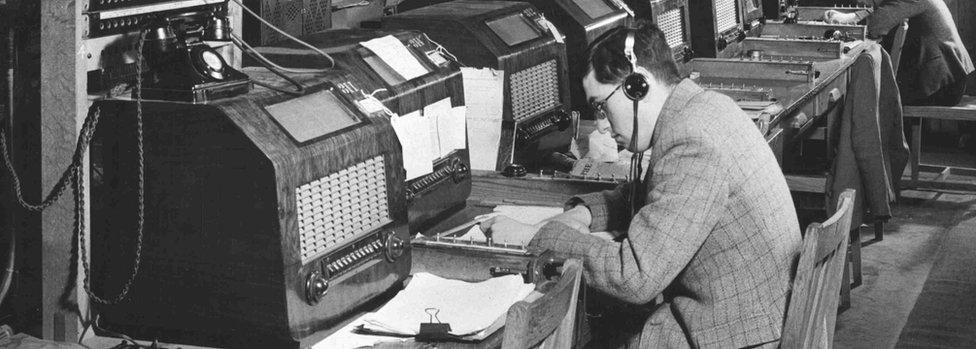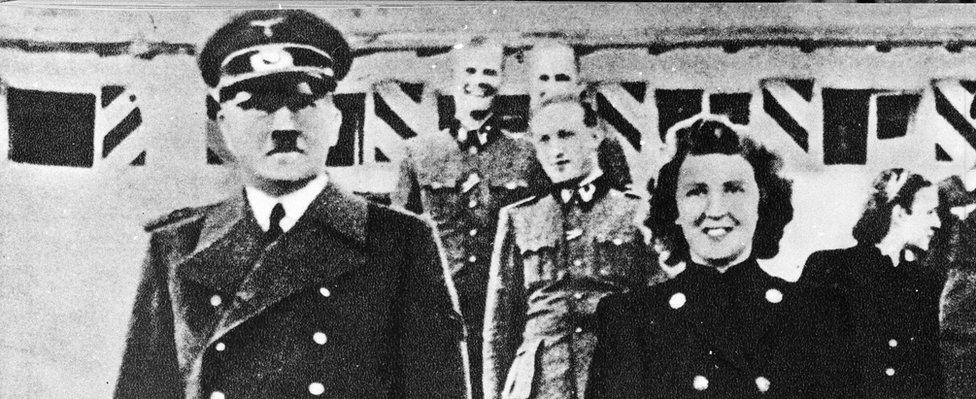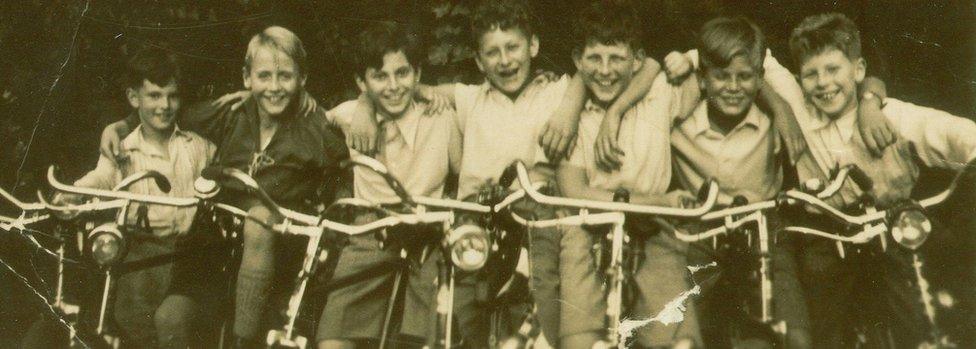Death of Hitler: How the world found out from the BBC
- Published

Karl Lehmann was one of some 1,000 people working at Caversham Park by the end of the war
It was late in the evening on 1 May 1945 and Karl Lehmann was working at his desk on the outskirts of Reading, 40 miles (65km) to the west of London.
Soviet forces were closing in on Berlin and the war with Germany had reached its final stages.
The 24-year-old was monitoring German state radio when listeners were told to prepare for an important announcement.
"They played solemn music and then they said Hitler had died," he recalls. "They said he had fallen fighting Bolshevism. It was announced in a very sombre way."
He and his younger brother, Georg, had been sent from Germany to Britain by their parents nine years earlier to escape the Nazis' increasing persecution of Jewish people. Their father was a German Jew.
"I felt total relief because [Hitler] had ruined my life."
Karl Lehmann was working at BBC Monitoring, set up on the eve of World War Two. Its main aim was to listen to, translate and inform the British Government about radio broadcasts from Germany and its allies, as well as from other countries.

The German monitoring team was largely made up of Jews, socialists and trade unionists who had fled Nazi persecution
"We were the first people in Britain to hear the announcement," he remembers. "The whole building cheered. We realised how important it was. It meant the end of the war against Germany."
It was not for another six days that Germany officially surrendered.
While there was no doubt that Hitler was dead, it emerged only later that he had killed himself.
"Fallen meant 'died in active combat' - we heard a big lie," Karl says.
"They didn't admit he had committed suicide because that would have been the end straight away. But that was the Germans themselves announcing over their radio that Hitler was dead. It was as official as you get."
The newsreader also said that Hitler had appointed Grand Admiral Karl Dönitz as his successor.

Hitler's downfall 1945

Adolf Hitler married Eva Braun on 29 April as the Red Army closed in on the Reich Chancellery
15-16 April Final assault on Berlin begins overnight when Soviet forces launch a powerful artillery barrage on German forces to the east of the city
21 April Red Army enters outskirts of Berlin, captures outlying suburbs
27 April Soviet and American forces meet at the River Elbe in Germany, successfully cutting Germany army in two
29 April Hitler and Eva Braun marry in his bunker under Reich Chancellery headquarters
30 April Hitler and his new wife kill themselves and their bodies are burned
1 May German radio announces Hitler's death
7 May Germany signs unconditional surrender, bringing to an end six years of war in Europe

The German announcement of Hitler's death was quickly translated by Ernst Gombrich, a supervisor in the German Monitoring team who went on to become a renowned art historian.
"He wrote it out on bits of paper, which was a terrible thing to do because he might have muddled them up, and he had terrible handwriting," says his former colleague.
"He did it for speed because we usually typed things or wrote them out neatly."
Ernst Gombrich then phoned the Cabinet Office in London to tell the government. BBC newsrooms were also informed and broadcast the news to the nation and the world.
Read more about Hitler's end and the BBC at war
Now 97, Karl says he remembers an entire nation cheering the news.
For him personally it meant he could see his parents again. His father, Walter, had run a wholesale millinery business in Cologne, which he was forced by the Nazis to sell for next to nothing before he and his wife, Edith, fled Germany, eventually reaching the US.
A thousand people were working at BBC Monitoring at Caversham Park by the time of Hitler's death. Among them was a senior Italian monitor, Doris Penny, who became Karl's first wife.

Karl Lehmann (3rd from L) grew up in Cologne but was sent to Britain in 1936 with his brother Georg (far L)
Of the 40 in the German team many were Jews, socialists and trade unionists who had fled Nazi persecution.
"They were delighted by Hitler's death as he had forced them to emigrate," Karl says.
And the Nazi dictator's demise had one less obvious dividend - for the German monitors.
"Hitler was very difficult to translate," Karl remembers.
"He was a terrible writer and his speeches were unimpressive when you read them in the German but totally different when he spoke. He relied on his oratory. It meant we wouldn't have to translate him anymore."